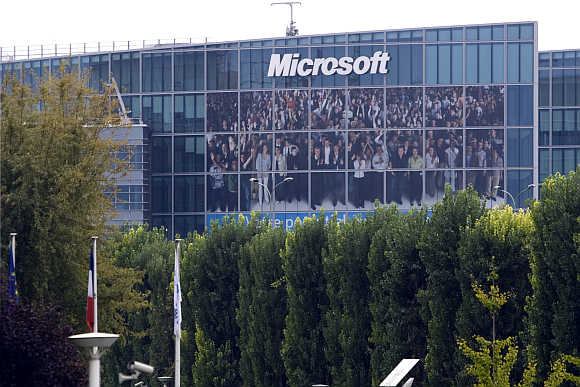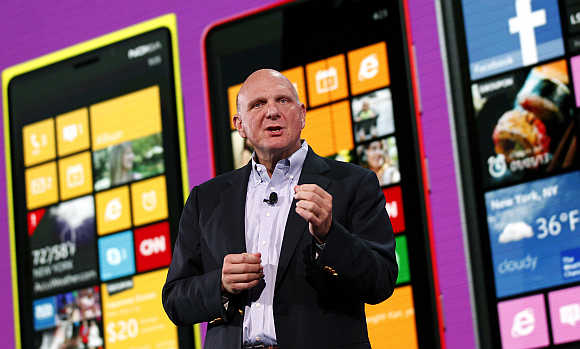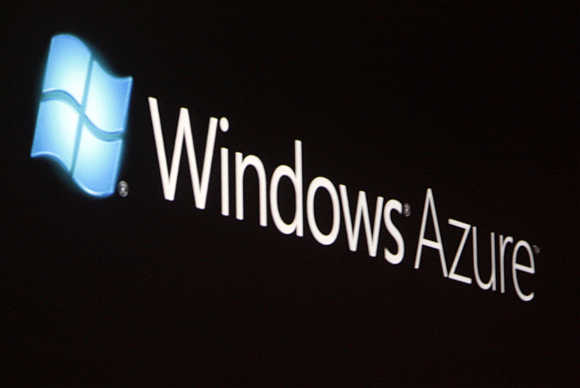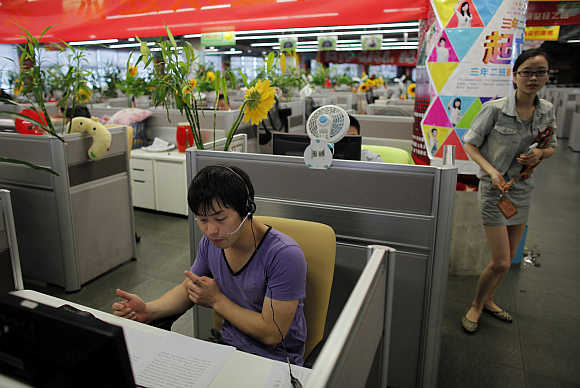Photographs: Charles Platiau/Reuters
Microsoft is staging a comeback in China. The world's biggest software maker hopes to use the twin technological disruptions of cloud computing and mobile devices to get a second bite of a market where profit has proved elusive.
Yet the financial benefits may prove no less hard to grasp the second time round.
...
Microsoft again eyes Chinese market, but piracy still a hurdle
Image: Microsoft CEO Steve Ballmer in San Francisco, California.Photographs: Robert Galbraith/Reuters
China has been a piracy trap for Microsoft: Many use its products, but few pay. Founder Bill Gates famously argued that he would rather see Chinese users steal his products than someone else's, and they took him at his word.
Chief Executive Steve Ballmer has complained that Microsoft generates less revenue in China than in the Netherlands - though that will have changed since Microsoft started charging smartphone makers like ZTE patent fees.
...
Microsoft again eyes Chinese market, but piracy still a hurdle
Image: Windows Azure is set to launch in June.Photographs: Fred Prouser/Reuters
Cloud and mobile services may provide an antidote. Windows Azure, the company's cloud computing platform, is set to launch in June, and the hope is that piracy will be less of a problem in the cloud, where companies and developers store data and software on third-party servers rather than local PCs.
In mobile, operating systems tend to be pre-installed by handset manufacturers, which creates tighter control over who's using what.
...
Microsoft again eyes Chinese market, but piracy still a hurdle
Image: An employee talks on the phone at the call centre of Alibaba (China) Technology at its headquarters on the outskirts of Hangzhou, Zhejiang province.Photographs: Carlos Barria/Reuters
Yet competition is fierce. Alibaba, which already handles over 80 per cent of online commerce, has high hopes for its own cloud computing service. While revenue from "public cloud" services are set to grow to $3.8 billion by 2020, according to Forrester, that's still less than half the Business Software Alliance's estimate of the Chinese market for illegal software.
...
Microsoft again eyes Chinese market, but piracy still a hurdle
Image: A Google Android figurine sits on the welcome desk at the Google office in Toronto, Canada.Photographs: Mark Blinch/Reuters
As for mobile, the industry is dominated by versions of Google's Android operating system. Microsoft may also escape the piracy trap only to fall into a political one. Foreigners aren't allowed to offer "value-added telecoms" by themselves, so Microsoft must share its cloud revenue with a local partner.
Since cloud computing features in the Chinese government's current five-year plan, the market is likely to develop in ways that favour local players. That makes Microsoft's chances of turning China into a big source of revenue look pretty nebulous.
...
Microsoft again eyes Chinese market, but piracy still a hurdle
Image: An aerial view shows vehicles travelling on intersections at night in downtown Shanghai.Photographs: Aly Song/Reuters
Context news
i) Microsoft plans to hire thousands of new employees in China for the launch of its cloud computing services and the roll-out of smartphones, Chief Executive Steve Ballmer said on May 22. The US software maker currently has a workforce in the country of around 4,000.
...
Microsoft again eyes Chinese market, but piracy still a hurdle
Image: A man walks in Lujiazui, a financial district in Pudong, Shanghai.Photographs: Carlos Barria/Reuters
ii) Microsoft is due to launch Windows Azure, its cloud computing platform, in China in June, in partnership with local company 21ViaNet. Under the agreement, 21ViaNet would collect client revenues and pass a percentage on to Microsoft. China restricts foreign companies' ability to offer "value added telecoms" services, leading most to partner with local players.
...
Microsoft again eyes Chinese market, but piracy still a hurdle
Image: Cyclists visit a Dutch tulip field in Noordwijk, the Netherlands.Photographs: Michael Kooren/Reuters
iii) In 2011 Ballmer complained that China provided less revenue for Microsoft than the Netherlands, despite having a population more than 75 times bigger. According to the Business Software Alliance, 77 per cent of software by value was pirated in 2011, based on an estimated illegal software market worth $9 billion.










article